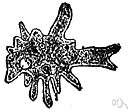ameba
Also found in: Thesaurus, Medical, Encyclopedia, Wikipedia.
a·me·ba
(ə-mē′bə)n.
Variant of amoeba.
American Heritage® Dictionary of the English Language, Fifth Edition. Copyright © 2016 by Houghton Mifflin Harcourt Publishing Company. Published by Houghton Mifflin Harcourt Publishing Company. All rights reserved.
ameba
(əˈmiːbə)n, pl -bae (-biː) or -bas
(Animals) the usual US spelling of amoeba
aˈmebic adj
Collins English Dictionary – Complete and Unabridged, 12th Edition 2014 © HarperCollins Publishers 1991, 1994, 1998, 2000, 2003, 2006, 2007, 2009, 2011, 2014
a•me•ba
or a•moe•ba
(əˈmi bə)n., pl. -bas, -bae (-bē).
1. any of numerous one-celled aquatic or parasitic protozoa of the order Amoebida, having a jellylike mass of cytoplasm that forms temporary pseudopodia, by which the organism moves and engulfs food particles.
2. a protozoan of the genus Amoeba, inhabiting bottom vegetation of freshwater ponds and streams: used widely in laboratory studies.
[1875–80; < New Latin amoeba < Greek amoibḗ change, alteration, n. derivative of ameíbein to exchange]
a•me′bic, adj.
a•me′boid, adj.
Random House Kernerman Webster's College Dictionary, © 2010 K Dictionaries Ltd. Copyright 2005, 1997, 1991 by Random House, Inc. All rights reserved.
a·me·ba
(ə-mē′bə) Another spelling of amoeba.
The American Heritage® Student Science Dictionary, Second Edition. Copyright © 2014 by Houghton Mifflin Harcourt Publishing Company. Published by Houghton Mifflin Harcourt Publishing Company. All rights reserved.
ThesaurusAntonymsRelated WordsSynonymsLegend:
Switch to new thesaurus
| Noun | 1. |  ameba - naked freshwater or marine or parasitic protozoa that form temporary pseudopods for feeding and locomotion ameba - naked freshwater or marine or parasitic protozoa that form temporary pseudopods for feeding and locomotionrhizopod, rhizopodan - protozoa characterized by a pseudopod endameba - any ameba of the genus Endamoeba |
Based on WordNet 3.0, Farlex clipart collection. © 2003-2012 Princeton University, Farlex Inc.